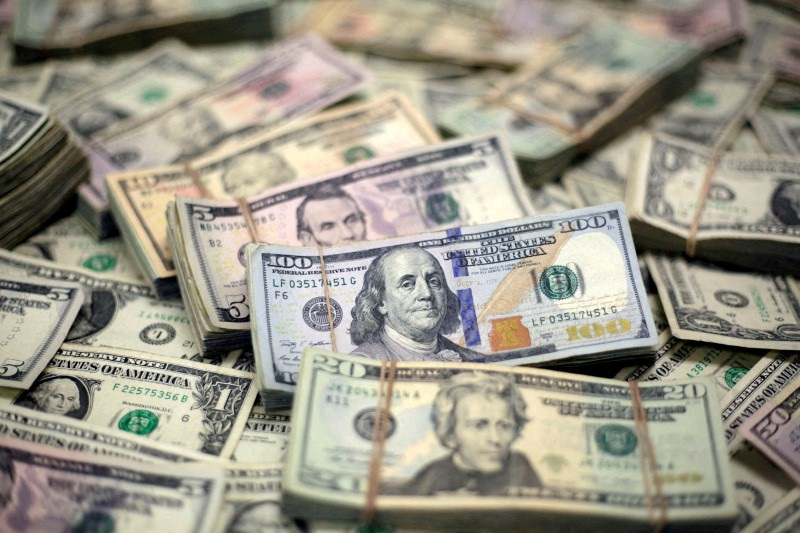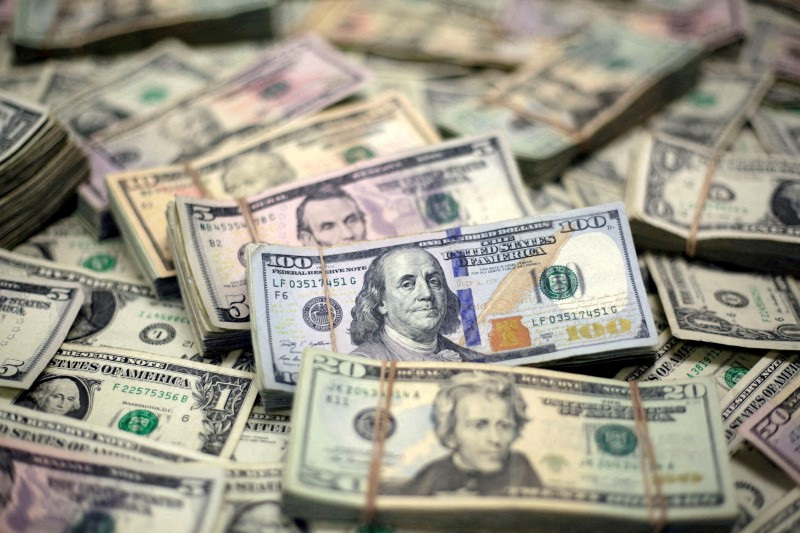
By Amanda Cooper
LONDON (Reuters) – The dollar held near four-month highs on Thursday, having scored its biggest one-day rally in two years following Donald Trump’s win in the U.S. presidential election, and as investors prepped for several central bank decisions including the Federal Reserve.
Sterling rallied ahead of a Bank of England meeting, while the Swedish and Norwegian crowns edged up after in-line decisions from their respective central banks.
Front and centre, however, was the dollar, which rose by as much as 2% at one point against a basket of currencies on Wednesday, as investors piled into U.S. assets that they expect would benefit from Trump’s proposed policies on tariffs and taxes.
Trump’s win is unlikely to make any immediate difference to the Fed, which is expected to cut interest rates by 25 basis points later in the day. So investors will start to look to who Trump’s key appointees might be, as well as whether or not his Republican party wins both chambers of Congress in a “Red sweep”, which could dictate how easily he may enact some of his proposals.
“If there is, then we will probably, in the market collectively, conclude he will get more of his fiscal agenda through. And that could be dollar-supportive,” Rabobank currency strategist Jane Foley said.
“There is going to be a lot of back and forth to try and work out exactly what is the inflation impact of this going to be, and therefore, how is the Fed going to react? But, generally speaking, I think all of that is certainly dollar-positive through 2025,” she said.
More immediately, traders will want the Fed to indicate what to expect in December and beyond, particularly after last week’s October jobs report, which was well below expectations, due in large part to disruption from recent hurricanes and labour strikes.
Trump’s victory has also fuelled speculation the Fed might reduce rates at a slower and shallower pace, as his policies on restricting illegal immigration and enacting new tariffs could boost inflation.
Markets now see about a 67% chance the Fed will also cut rates next month, down from 77% on Tuesday, according to the CME Group’s (NASDAQ:CME) Fed Watch Tool.
The dollar index, which measures the U.S. currency against six others, was down 0.3% at 104.84 after surging to its highest since July 3 on Wednesday, when it logged its biggest single-day gain since September 2022, up 1.5%.
GERMAN CRISIS
The euro rose 0.3% to $1.0758, having tumbled as low as $1.068275 for the first time since July 27 on Wednesday.
The single European currency shrugged off political crisis in Germany, where the already awkward coalition led by Chancellor Olaf Scholz collapsed late on Wednesday.
“This puts into stark relief the challenge for the European economy faced by a looming trade war and weak domestic demand,” ING strategist Chris Turner said.
Elsewhere in Europe, sterling rose 0.3% to $1.2919 ahead of the rate decision from the BoE, which is likely to cut interest rates for the second time since 2020.
The big question for investors is what it signals about the outlook after the government’s inflation-raising budget.
Sweden’s Riksbank cut rates by half a point, as expected, leaving the crown up 0.1% against the euro at 11.632, while the Norges Bank left Norwegian rates unchanged, pushing the crown up 0.7% against the euro.
The yen hit a three-month low against the dollar of 154.715. Japan’s top currency diplomat Atsushi Mimura flagged officials’ readiness to act, marking the government’s strongest warning to speculators in recent months.
The Japanese currency was last up 0.4% at 153.95.
The yuan rose 0.5% to after China’s exports blew past forecasts, having earlier touched lowest in nearly three-months.

Offshore yuan traded at 7.1713 yuan per dollar.
Bitcoin fell 1.2% to $75,025, having hit a record high on Wednesday of $76,499.99. Ether rallied 5% to $2,828, around its highest since early August.
This post is originally published on INVESTING.



